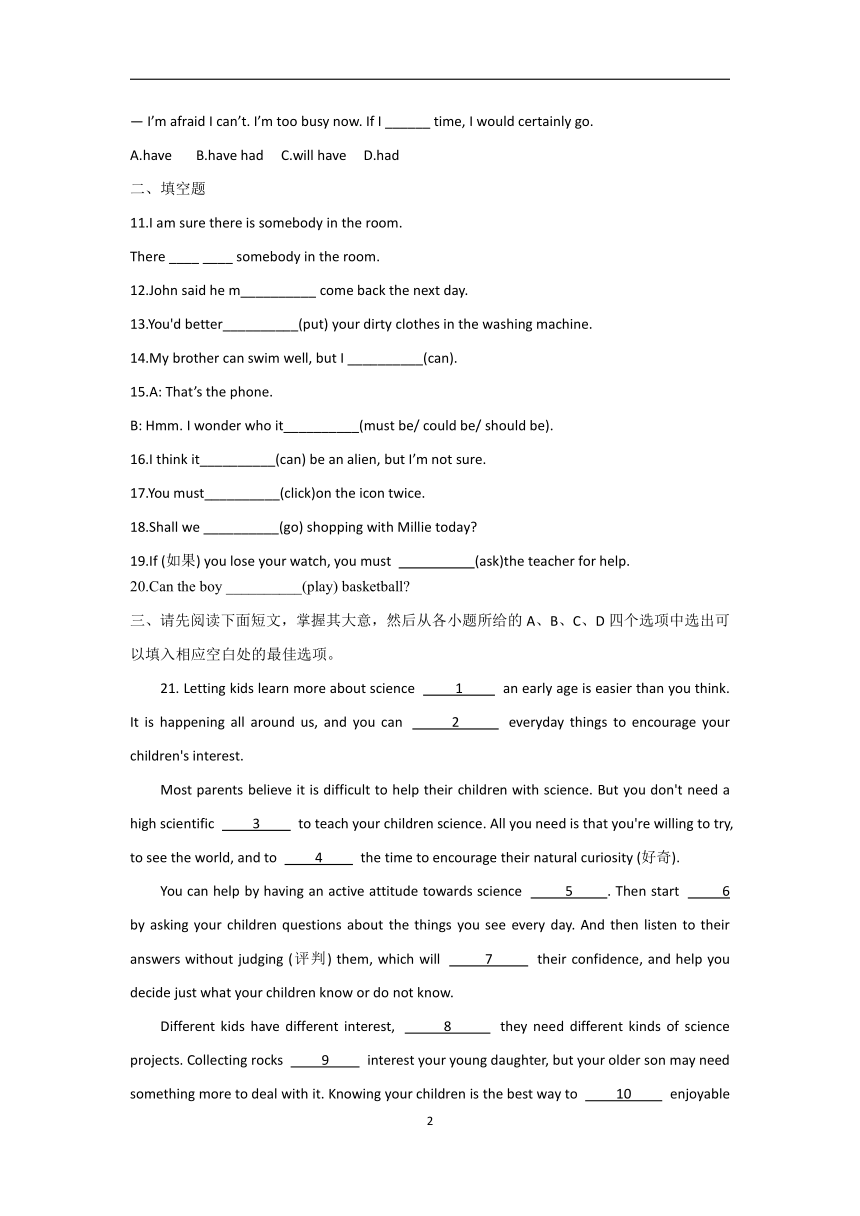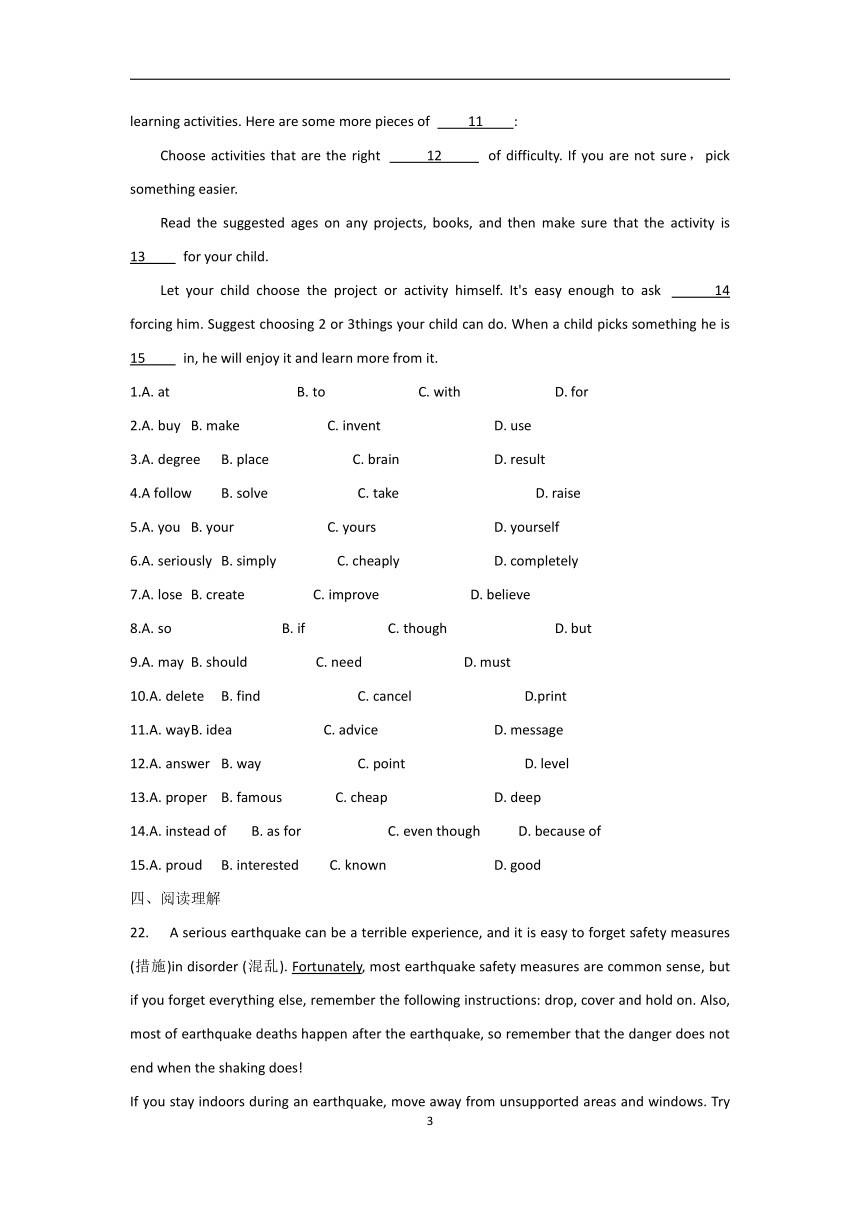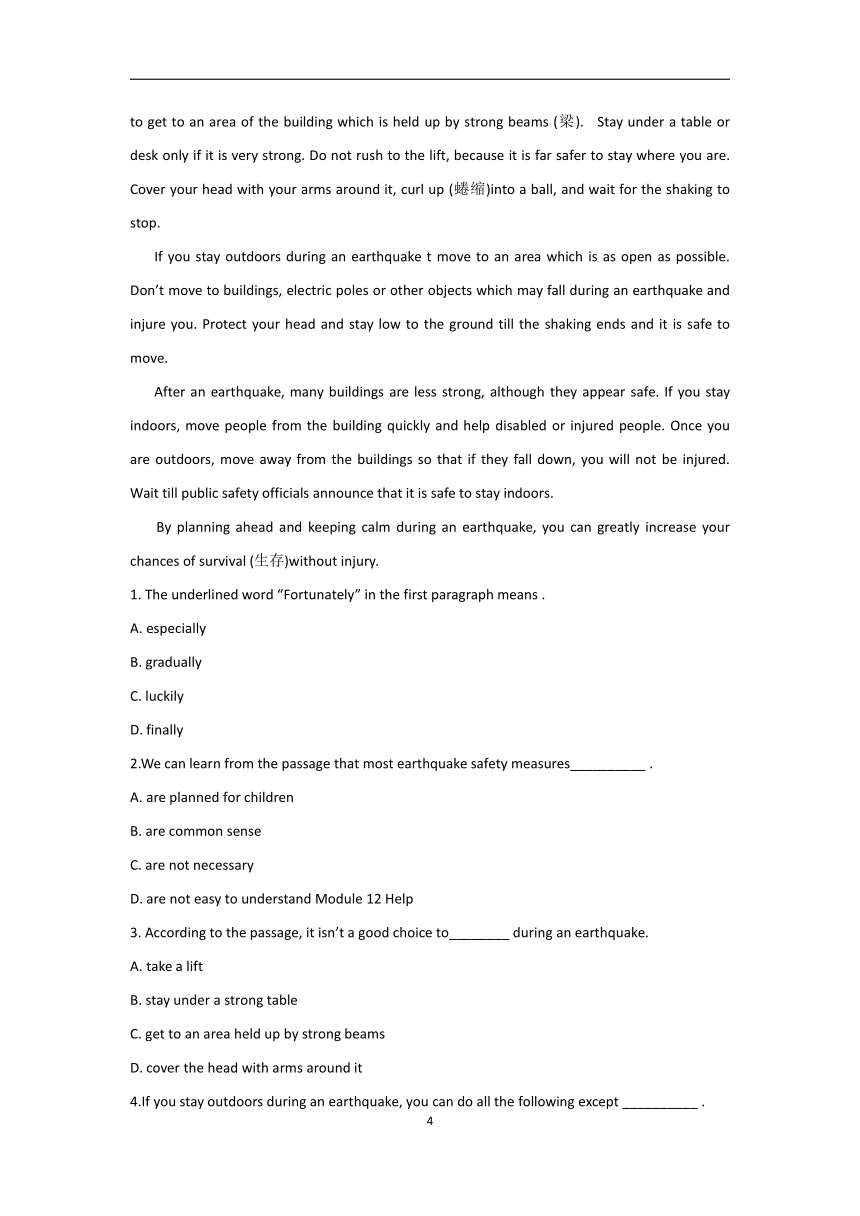2023年中考英语一轮复习专项练习:专题五 考点07 情态动词和虚拟语气(C卷)(含解析)
文档属性
| 名称 | 2023年中考英语一轮复习专项练习:专题五 考点07 情态动词和虚拟语气(C卷)(含解析) |

|
|
| 格式 | doc | ||
| 文件大小 | 27.1KB | ||
| 资源类型 | 教案 | ||
| 版本资源 | 通用版 | ||
| 科目 | 英语 | ||
| 更新时间 | 2022-12-25 08:09:58 | ||
图片预览




文档简介
专题五 考点07 情态动词和虚拟语气(C卷)
一、单选题
1.—Mum, why do I have to wash hands so many times a day
—For your health, you _____ be too careful.
A.can't B.shouldn't C.mustn't D.needn't
2.—Are you going to the cinema tonight
—I don't know. I _____ go or I _____ stay at home.
A. will; will B. must; must C. should; should D. might; might
3.—Yuan Longping, a famous Chinese scientist, is now doing research on sea rice.
—If farmers ________ start planting rice in salty water, China’s food supply will surely rise.
A.might B.can C.must D.should
4.According to the rule, used batteries ________ be dropped in the red bin for harmful wastes.
A.may B.would C.should D.might
5.—They ________ be leaving for Yunnan next month. But I’m not sure.
—We can ask your father about it.
A.can B.must C.might D.should
6.—You ________ be more careful, or you will do it again.
—OK, I see. Thank you.
A.might B.can C.may D.should
7.—I don’t care what people think.
—Well, you ________. You are not alone in the world.
A.can B.should C.may D.will
8.—Listen! Tom ________ be listening to the music while doing his homework.
—Let’s go upstairs to remind him to turn it off.
A.should B.could C.would D.must
9.I______I___________fly in the sky just like a bird.
A.hope; could B.imagine; can
C.wish; could D.suppose; could
10.—Come and join us, Betty!
— I’m afraid I can’t. I’m too busy now. If I ______ time, I would certainly go.
A.have B.have had C.will have D.had
二、填空题
11.I am sure there is somebody in the room.
There ____ ____ somebody in the room.
12.John said he m__________ come back the next day.
13.You'd better__________(put) your dirty clothes in the washing machine.
14.My brother can swim well, but I __________(can).
15.A: That’s the phone.
B: Hmm. I wonder who it__________(must be/ could be/ should be).
16.I think it__________(can) be an alien, but I’m not sure.
17.You must__________(click)on the icon twice.
18.Shall we __________(go) shopping with Millie today
19.If (如果) you lose your watch, you must (ask)the teacher for help.
20.Can the boy __________(play) basketball
三、请先阅读下面短文,掌握其大意,然后从各小题所给的A、B、C、D四个选项中选出可以填入相应空白处的最佳选项。
21. Letting kids learn more about science 1 an early age is easier than you think. It is happening all around us, and you can 2 everyday things to encourage your children's interest.
Most parents believe it is difficult to help their children with science. But you don't need a high scientific 3 to teach your children science. All you need is that you're willing to try, to see the world, and to 4 the time to encourage their natural curiosity (好奇).
You can help by having an active attitude towards science 5 . Then start 6 by asking your children questions about the things you see every day. And then listen to their answers without judging (评判) them, which will 7 their confidence, and help you decide just what your children know or do not know.
Different kids have different interest, 8 they need different kinds of science projects. Collecting rocks 9 interest your young daughter, but your older son may need something more to deal with it. Knowing your children is the best way to 10 enjoyable learning activities. Here are some more pieces of 11 :
Choose activities that are the right 12 of difficulty. If you are not sure,pick something easier.
Read the suggested ages on any projects, books, and then make sure that the activity is 13 for your child.
Let your child choose the project or activity himself. It's easy enough to ask 14 forcing him. Suggest choosing 2 or 3things your child can do. When a child picks something he is 15 in, he will enjoy it and learn more from it.
1.A. at B. to C. with D. for
2.A. buy B. make C. invent D. use
3.A. degree B. place C. brain D. result
4.A follow B. solve C. take D. raise
5.A. you B. your C. yours D. yourself
6.A. seriously B. simply C. cheaply D. completely
7.A. lose B. create C. improve D. believe
8.A. so B. if C. though D. but
9.A. may B. should C. need D. must
10.A. delete B. find C. cancel D.print
11.A. way B. idea C. advice D. message
12.A. answer B. way C. point D. level
13.A. proper B. famous C. cheap D. deep
14.A. instead of B. as for C. even though D. because of
15.A. proud B. interested C. known D. good
四、阅读理解
22. A serious earthquake can be a terrible experience, and it is easy to forget safety measures (措施)in disorder (混乱). Fortunately, most earthquake safety measures are common sense, but if you forget everything else, remember the following instructions: drop, cover and hold on. Also, most of earthquake deaths happen after the earthquake, so remember that the danger does not end when the shaking does!
If you stay indoors during an earthquake, move away from unsupported areas and windows. Try to get to an area of the building which is held up by strong beams (梁). Stay under a table or desk only if it is very strong. Do not rush to the lift, because it is far safer to stay where you are. Cover your head with your arms around it, curl up (蜷缩)into a ball, and wait for the shaking to stop.
If you stay outdoors during an earthquake t move to an area which is as open as possible. Don’t move to buildings, electric poles or other objects which may fall during an earthquake and injure you. Protect your head and stay low to the ground till the shaking ends and it is safe to move.
After an earthquake, many buildings are less strong, although they appear safe. If you stay indoors, move people from the building quickly and help disabled or injured people. Once you are outdoors, move away from the buildings so that if they fall down, you will not be injured. Wait till public safety officials announce that it is safe to stay indoors.
By planning ahead and keeping calm during an earthquake, you can greatly increase your chances of survival (生存)without injury.
1. The underlined word “Fortunately” in the first paragraph means .
A. especially
B. gradually
C. luckily
D. finally
2.We can learn from the passage that most earthquake safety measures__________ .
A. are planned for children
B. are common sense
C. are not necessary
D. are not easy to understand Module 12 Help
3. According to the passage, it isn’t a good choice to________ during an earthquake.
A. take a lift
B. stay under a strong table
C. get to an area held up by strong beams
D. cover the head with arms around it
4.If you stay outdoors during an earthquake, you can do all the following except __________ .
A. trying to protect your head
B. moving to an open place
C. moving away from buildings
D. taking the disabled people into the room
5.The purpose of the passage is mainly to tell us how to_______.
A. stay away from an earthquake
B. predict an earthquake
C. control an earthquake
D. keep safe during and after an earthquake
答案以及解析
一、单选题
1.答案:A
解析:考查情态动词。句意: 妈妈, 为什么我一天要洗这么多次手呢? 为了你的健康, 你再小心也不为过。can't be too后跟形容词, 表示"再也不为过/不过分", careful意为"小心的; 仔细的"。故选A。
2.答案:D
解析:考查情态动词的用法。句意: —你今晚要去看电影吗?—我不知道。我可能去也可能待在家里。根据"I don't know."可知选D。
3.答案:B
解析:句意:—中国著名的科学家袁隆平现在正在研究海水稻。—如果农民开始在盐水中种植水稻,中国的粮食供应肯定会增加。考查情态动词,might可能;can能,会;must必须;should应该。根据“China’s food supply will surely rise.”,可知应该是如果农民能开始在盐水中种植水稻,中国的粮食供应肯定会增加。故选B。
4.答案:C
解析:句意:根据规定,使用过的电池应丢弃在红色的有害废物箱中。考查情态动词辨析。may也许;would将会;should应该;might可能。根据“used batteries…be dropped in the red bin for harmful wastes”可知,使用过的电池应丢弃在红色的有害废物箱中,故选C。
5.答案:C
解析:句意:—他们可能在下个月去云南。但我又不确定。—我们可以去问问你的爸爸关于这事。考查情态动词。can能; must必须;might可能;should应该,根据后面的“But I’m not sure”可知表示的是“可能”,故选C。
6.答案:D
解析:句意:—你应该要更加细心,否则你要再做一次。—好的,我明白了,谢谢。考查情态动词。might可能(may的过去式);can能,会;may可能、也许;should应该;根据语境可知此处指“应该更仔细”;故选D。
7.答案:B
解析:句意:—我不在乎别人怎么想。—嗯,你应该。你不是独自在这个世界上。考查情态动词辨析。can能够;should应该;may可能;will将。根据“Well, you... You are not alone in the world”可知,这是一个劝告对方的话,填“should”符合语境,故选B。
8.答案:D
解析:句意:—听!汤姆一定是一边做作业一边听音乐。—让我们上楼去提醒他把音乐关掉。考查情态动词用法。should应该;could能够,可表示委婉语气或用于过去时中;would将会,将要;must必须,表示推测时,意为“一定”。由答语中的“turn it off”可知,此句是推测汤姆一定是在边听音乐边做作业,故选D。
9.答案:C
10.答案:D
解析:试题分析:句意:贝蒂,来加入我们到我们中吧!- 恐怕不行,现在我太忙了。如果我有时间我当然会去。虚拟语气是一种特殊的动词形式,用来表示说话人所说的话并不是事实,而是一种假设、愿望、怀疑或推测。其主要有三种结构:
1、与现在事实相反
若与现在事实相反,条件从句的谓语用过去式(be通常用were),主句谓语用“should (would, could, might)+动词原形”
2、与过去事实相反
若与过去事实相反,条件从句的谓语用过去完成时(had+过去分词),主句谓语用“should (would, could, might)+have+过去分词”
3、与将来事实相反
若与将来事实相反,条件从句的谓语用过去式(be通常用were),主句谓语用“should (would, could, might)+动词原形”。根据句意可知该句是与现在的事实相反,故选D。
二、填空题
11.答案:must be
12.答案:might
13.答案:put
14.答案:can’t
15.答案:could be
16.答案:could
17.答案:click
18.答案:go
19.答案:ask
20.答案:play
三、完形填空
21.答案:1.A; 2.D; 3.A; 4.C; 5.D; 6.B; 7.C; 8.A; 9.A; 10.B; 11.C; 12.D; 13.A; 14.A; 15.B
四、阅读理解
22.答案:CBADD
解析:1.C 词义猜测题。裉据第一段 it is easy to forget safety measures in disorder(在混乱中很容易忘记安全措施) 和most earthquake safety measures are common sense(大多数的地震安全措施都是常 识)可推知, fortunately意为幸运地,故选C项。
2.B细节理解题。根据第一段中的 Fortunately, most earthquake safety measures are common sense 可知,大多数的地展安全措施 都是常识。故应选B项。
3.A 细节理解题。根据第二段中的Do not rush to the lift, because it is far safer to stay where you are.可知,地震发生时, 不应使用电梯,故应选A项。
4.D细节理解题。根据第三段中的If you stay outdoors during an earthquake, move to an area which is as open as possible. Don't move to buildings, electric poles or other objects which may fall during an earthquake and injure you. Protect your head…可知,地震发生时,如果你在户外,要去一个幵阔的地方,不要去大楼、 电线杆或其他可能倒塌而伤到你的地方,还有要保护好你的 头。由此可知只有D项表述错误。
5.主旨大意题。通读全文可知,短文主要讲述在地震中和地震后如何自我保护,故选D项。
2
一、单选题
1.—Mum, why do I have to wash hands so many times a day
—For your health, you _____ be too careful.
A.can't B.shouldn't C.mustn't D.needn't
2.—Are you going to the cinema tonight
—I don't know. I _____ go or I _____ stay at home.
A. will; will B. must; must C. should; should D. might; might
3.—Yuan Longping, a famous Chinese scientist, is now doing research on sea rice.
—If farmers ________ start planting rice in salty water, China’s food supply will surely rise.
A.might B.can C.must D.should
4.According to the rule, used batteries ________ be dropped in the red bin for harmful wastes.
A.may B.would C.should D.might
5.—They ________ be leaving for Yunnan next month. But I’m not sure.
—We can ask your father about it.
A.can B.must C.might D.should
6.—You ________ be more careful, or you will do it again.
—OK, I see. Thank you.
A.might B.can C.may D.should
7.—I don’t care what people think.
—Well, you ________. You are not alone in the world.
A.can B.should C.may D.will
8.—Listen! Tom ________ be listening to the music while doing his homework.
—Let’s go upstairs to remind him to turn it off.
A.should B.could C.would D.must
9.I______I___________fly in the sky just like a bird.
A.hope; could B.imagine; can
C.wish; could D.suppose; could
10.—Come and join us, Betty!
— I’m afraid I can’t. I’m too busy now. If I ______ time, I would certainly go.
A.have B.have had C.will have D.had
二、填空题
11.I am sure there is somebody in the room.
There ____ ____ somebody in the room.
12.John said he m__________ come back the next day.
13.You'd better__________(put) your dirty clothes in the washing machine.
14.My brother can swim well, but I __________(can).
15.A: That’s the phone.
B: Hmm. I wonder who it__________(must be/ could be/ should be).
16.I think it__________(can) be an alien, but I’m not sure.
17.You must__________(click)on the icon twice.
18.Shall we __________(go) shopping with Millie today
19.If (如果) you lose your watch, you must (ask)the teacher for help.
20.Can the boy __________(play) basketball
三、请先阅读下面短文,掌握其大意,然后从各小题所给的A、B、C、D四个选项中选出可以填入相应空白处的最佳选项。
21. Letting kids learn more about science 1 an early age is easier than you think. It is happening all around us, and you can 2 everyday things to encourage your children's interest.
Most parents believe it is difficult to help their children with science. But you don't need a high scientific 3 to teach your children science. All you need is that you're willing to try, to see the world, and to 4 the time to encourage their natural curiosity (好奇).
You can help by having an active attitude towards science 5 . Then start 6 by asking your children questions about the things you see every day. And then listen to their answers without judging (评判) them, which will 7 their confidence, and help you decide just what your children know or do not know.
Different kids have different interest, 8 they need different kinds of science projects. Collecting rocks 9 interest your young daughter, but your older son may need something more to deal with it. Knowing your children is the best way to 10 enjoyable learning activities. Here are some more pieces of 11 :
Choose activities that are the right 12 of difficulty. If you are not sure,pick something easier.
Read the suggested ages on any projects, books, and then make sure that the activity is 13 for your child.
Let your child choose the project or activity himself. It's easy enough to ask 14 forcing him. Suggest choosing 2 or 3things your child can do. When a child picks something he is 15 in, he will enjoy it and learn more from it.
1.A. at B. to C. with D. for
2.A. buy B. make C. invent D. use
3.A. degree B. place C. brain D. result
4.A follow B. solve C. take D. raise
5.A. you B. your C. yours D. yourself
6.A. seriously B. simply C. cheaply D. completely
7.A. lose B. create C. improve D. believe
8.A. so B. if C. though D. but
9.A. may B. should C. need D. must
10.A. delete B. find C. cancel D.print
11.A. way B. idea C. advice D. message
12.A. answer B. way C. point D. level
13.A. proper B. famous C. cheap D. deep
14.A. instead of B. as for C. even though D. because of
15.A. proud B. interested C. known D. good
四、阅读理解
22. A serious earthquake can be a terrible experience, and it is easy to forget safety measures (措施)in disorder (混乱). Fortunately, most earthquake safety measures are common sense, but if you forget everything else, remember the following instructions: drop, cover and hold on. Also, most of earthquake deaths happen after the earthquake, so remember that the danger does not end when the shaking does!
If you stay indoors during an earthquake, move away from unsupported areas and windows. Try to get to an area of the building which is held up by strong beams (梁). Stay under a table or desk only if it is very strong. Do not rush to the lift, because it is far safer to stay where you are. Cover your head with your arms around it, curl up (蜷缩)into a ball, and wait for the shaking to stop.
If you stay outdoors during an earthquake t move to an area which is as open as possible. Don’t move to buildings, electric poles or other objects which may fall during an earthquake and injure you. Protect your head and stay low to the ground till the shaking ends and it is safe to move.
After an earthquake, many buildings are less strong, although they appear safe. If you stay indoors, move people from the building quickly and help disabled or injured people. Once you are outdoors, move away from the buildings so that if they fall down, you will not be injured. Wait till public safety officials announce that it is safe to stay indoors.
By planning ahead and keeping calm during an earthquake, you can greatly increase your chances of survival (生存)without injury.
1. The underlined word “Fortunately” in the first paragraph means .
A. especially
B. gradually
C. luckily
D. finally
2.We can learn from the passage that most earthquake safety measures__________ .
A. are planned for children
B. are common sense
C. are not necessary
D. are not easy to understand Module 12 Help
3. According to the passage, it isn’t a good choice to________ during an earthquake.
A. take a lift
B. stay under a strong table
C. get to an area held up by strong beams
D. cover the head with arms around it
4.If you stay outdoors during an earthquake, you can do all the following except __________ .
A. trying to protect your head
B. moving to an open place
C. moving away from buildings
D. taking the disabled people into the room
5.The purpose of the passage is mainly to tell us how to_______.
A. stay away from an earthquake
B. predict an earthquake
C. control an earthquake
D. keep safe during and after an earthquake
答案以及解析
一、单选题
1.答案:A
解析:考查情态动词。句意: 妈妈, 为什么我一天要洗这么多次手呢? 为了你的健康, 你再小心也不为过。can't be too后跟形容词, 表示"再也不为过/不过分", careful意为"小心的; 仔细的"。故选A。
2.答案:D
解析:考查情态动词的用法。句意: —你今晚要去看电影吗?—我不知道。我可能去也可能待在家里。根据"I don't know."可知选D。
3.答案:B
解析:句意:—中国著名的科学家袁隆平现在正在研究海水稻。—如果农民开始在盐水中种植水稻,中国的粮食供应肯定会增加。考查情态动词,might可能;can能,会;must必须;should应该。根据“China’s food supply will surely rise.”,可知应该是如果农民能开始在盐水中种植水稻,中国的粮食供应肯定会增加。故选B。
4.答案:C
解析:句意:根据规定,使用过的电池应丢弃在红色的有害废物箱中。考查情态动词辨析。may也许;would将会;should应该;might可能。根据“used batteries…be dropped in the red bin for harmful wastes”可知,使用过的电池应丢弃在红色的有害废物箱中,故选C。
5.答案:C
解析:句意:—他们可能在下个月去云南。但我又不确定。—我们可以去问问你的爸爸关于这事。考查情态动词。can能; must必须;might可能;should应该,根据后面的“But I’m not sure”可知表示的是“可能”,故选C。
6.答案:D
解析:句意:—你应该要更加细心,否则你要再做一次。—好的,我明白了,谢谢。考查情态动词。might可能(may的过去式);can能,会;may可能、也许;should应该;根据语境可知此处指“应该更仔细”;故选D。
7.答案:B
解析:句意:—我不在乎别人怎么想。—嗯,你应该。你不是独自在这个世界上。考查情态动词辨析。can能够;should应该;may可能;will将。根据“Well, you... You are not alone in the world”可知,这是一个劝告对方的话,填“should”符合语境,故选B。
8.答案:D
解析:句意:—听!汤姆一定是一边做作业一边听音乐。—让我们上楼去提醒他把音乐关掉。考查情态动词用法。should应该;could能够,可表示委婉语气或用于过去时中;would将会,将要;must必须,表示推测时,意为“一定”。由答语中的“turn it off”可知,此句是推测汤姆一定是在边听音乐边做作业,故选D。
9.答案:C
10.答案:D
解析:试题分析:句意:贝蒂,来加入我们到我们中吧!- 恐怕不行,现在我太忙了。如果我有时间我当然会去。虚拟语气是一种特殊的动词形式,用来表示说话人所说的话并不是事实,而是一种假设、愿望、怀疑或推测。其主要有三种结构:
1、与现在事实相反
若与现在事实相反,条件从句的谓语用过去式(be通常用were),主句谓语用“should (would, could, might)+动词原形”
2、与过去事实相反
若与过去事实相反,条件从句的谓语用过去完成时(had+过去分词),主句谓语用“should (would, could, might)+have+过去分词”
3、与将来事实相反
若与将来事实相反,条件从句的谓语用过去式(be通常用were),主句谓语用“should (would, could, might)+动词原形”。根据句意可知该句是与现在的事实相反,故选D。
二、填空题
11.答案:must be
12.答案:might
13.答案:put
14.答案:can’t
15.答案:could be
16.答案:could
17.答案:click
18.答案:go
19.答案:ask
20.答案:play
三、完形填空
21.答案:1.A; 2.D; 3.A; 4.C; 5.D; 6.B; 7.C; 8.A; 9.A; 10.B; 11.C; 12.D; 13.A; 14.A; 15.B
四、阅读理解
22.答案:CBADD
解析:1.C 词义猜测题。裉据第一段 it is easy to forget safety measures in disorder(在混乱中很容易忘记安全措施) 和most earthquake safety measures are common sense(大多数的地震安全措施都是常 识)可推知, fortunately意为幸运地,故选C项。
2.B细节理解题。根据第一段中的 Fortunately, most earthquake safety measures are common sense 可知,大多数的地展安全措施 都是常识。故应选B项。
3.A 细节理解题。根据第二段中的Do not rush to the lift, because it is far safer to stay where you are.可知,地震发生时, 不应使用电梯,故应选A项。
4.D细节理解题。根据第三段中的If you stay outdoors during an earthquake, move to an area which is as open as possible. Don't move to buildings, electric poles or other objects which may fall during an earthquake and injure you. Protect your head…可知,地震发生时,如果你在户外,要去一个幵阔的地方,不要去大楼、 电线杆或其他可能倒塌而伤到你的地方,还有要保护好你的 头。由此可知只有D项表述错误。
5.主旨大意题。通读全文可知,短文主要讲述在地震中和地震后如何自我保护,故选D项。
2
同课章节目录
- 词法
- 名词
- 动词和动词短语
- 动词语态
- 动词时态
- 助动词和情态动词
- 非谓语动词
- 冠词
- 代词
- 数词和量词
- 形容词副词及其比较等级
- 介词和介词短语
- 连词和感叹词
- 构词法
- 相似、相近词比较
- 句法
- 陈述句
- 一般疑问句和否定疑问句
- 特殊疑问句及选择疑问句
- 反意疑问句
- 存在句(There be句型)
- 宾语从句
- 定语从句
- 状语从句
- 主谓一致问题
- 简单句
- 并列句
- 复合句
- 主谓一致
- 主、表语从句
- 名词性从句
- 直接引语和间接引语
- 虚拟语气
- 感叹句
- 强调句
- 倒装句
- 祈使句
- 句子的成分
- 句子的分类
- 题型专区
- 单项选择部分
- 易错题
- 完形填空
- 阅读理解
- 词汇练习
- 听说训练
- 句型转换
- 补全对话
- 短文改错
- 翻译
- 书面表达
- 任务型阅读
- 语法填空
- 其他资料
